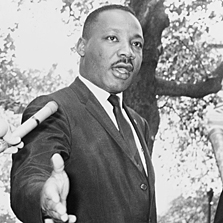
This week we commemorate and honor the legacy of Dr. Martin Luther King Jr. and the values of freedom and equality that Dr. King fought so hard for. This week (Jan 16) we also celebrate Religious Freedom Day, which commemorates the passage of the Virginia Statue for Religious Liberty, 226 years ago. This statute laid the ground work for the protections for religious freedom found in the First Amendment.
The First Amendment guarantees two interrelated aspects of religious freedom: the freedom to believe and to practice one’s religion and the freedom from government sponsorship of religion. Both are integral to ensuring religious liberty flourishes. Because the First Amendment’s religion clauses ensure we all have true freedom of conscience, we are not told what to believe or prohibited from practicing religion. As a result, people are free to preach in the public square, students are free to voluntarily pray in school, or a woman is free to wear a religious head scarf when accompanying her family to the county courthouse. It was this religious freedom that enabled black churches and houses of worship across the country to participate in the civil rights movement and bring about societal change. All of these represent what we are celebrating today. And all are strongly defended by the ACLU.
However sometimes freedom of religion is misidentified as the freedom to impose one’s beliefs on others. Whether it is requiring students at a public school to attend a mandatory assembly where a Christian rapper is proselytizing to students or school officials leading prayer at school athletic events, we’ve seen a number of groups and individuals conflate religious freedom with violating the Constitution. This is not freedom of religion. True freedom of religion is the guarantee that all are free to follow and practice their faith — or no faith at all — without governmental influence or interference. Dr. King might have said it best, that the church “is not the master or the servant of the state, but rather the conscience of the state. It must be the guide and the critic of the state, and never its tool."
Freedom of religion also does not differentiate between religions, providing none with favor or disfavor. Sadly though, throughout our country’s history, almost every religious group has been the target of discrimination at one point or another. Most recently individuals of the Muslim faith have been targeted with attempted bans on building Mosques and community centers, hateful congressional hearings on the so called “radicalization” of the American Muslim community, profiling by the FBI simply because of their religious affiliation, and even a state constitutional amendment (correctly enjoined by the courts) that did nothing more than target Islam for official condemnation.
As we reflect on the dual importance of this day let us remember that the values of freedom and equality that Martin Luther King Jr. fought so hard for include the freedom to practice one’s own religion free from government interference and the right to not be discriminated against for any reason, including religious belief. Dr. King said, “legally, constitutionally, or otherwise, the state certainly has no such right” to interfere in an individual’s exercise of religion. This statement held true 226 years ago, it held true when Martin Luther King Jr. said it, and it holds true today as we celebrate the work of Dr. King and Religious Freedom Day.
Learn more about religious freedom: Sign up for breaking news alerts, follow us on Twitter, and like us on Facebook.

